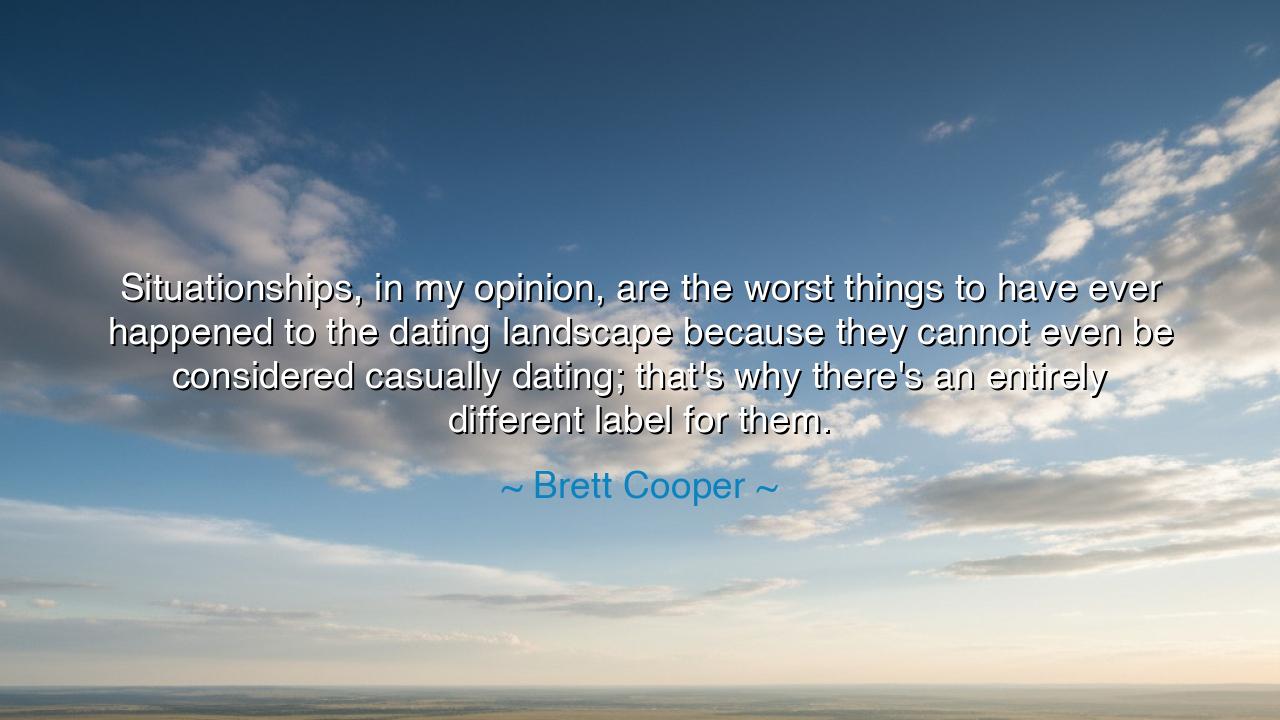
Situationships, in my opinion, are the worst things to have ever
Situationships, in my opinion, are the worst things to have ever happened to the dating landscape because they cannot even be considered casually dating; that's why there's an entirely different label for them.






In the age of shifting hearts and uncertain bonds, the thinker and commentator Brett Cooper spoke a truth that echoes like thunder through the hollow chambers of modern love: “Situationships, in my opinion, are the worst things to have ever happened to the dating landscape because they cannot even be considered casually dating; that’s why there’s an entirely different label for them.” These words, though born of the present, reach into the timeless struggles of the human soul—the battle between connection and confusion, between desire and commitment. For Cooper does not speak merely of fleeting romance; she laments the spiritual emptiness that arises when love is sought without clarity, and affection is given without purpose.
A situationship, as she names it, is that half-formed bond which neither blooms into love nor dies into honesty. It is a wandering twilight where two souls linger between intimacy and avoidance, fearful of defining what they share, yet unwilling to let it go. To the ancients, this would have seemed a sorrowful contradiction—a union without vow, a closeness without courage. In days of old, love was sacred because it demanded decision. Even the casual courtships of the past carried a weight of intention, a readiness to stand or fall for another. But in the era of endless options and glowing screens, love has become hesitant, forever waiting for a sign that never comes.
Cooper’s words strike at this hesitation like a sword. When she says “they cannot even be considered casually dating,” she points to the heart of the tragedy: that even the lightheartedness of casual affection once had honesty. “Casual dating” still held a sense of pursuit—a meeting of minds and hearts, however brief, under the shared understanding of what it was. But a situationship hides behind vagueness, shrouded in fear of responsibility. It is neither free nor faithful. It is a house built on sand, where both dwellers pretend it might someday be a home, though each secretly knows it will crumble with the tide.
History, too, bears witness to the dangers of undefined love. In the days of the Roman poet Catullus, he loved the woman Lesbia with passion unrestrained but was ensnared by her indecision. Their bond was neither loyal nor fleeting—it lingered in torment, marked by betrayal and longing. His verses speak of ecstasy and agony intertwined, of a love that consumes but never commits. So too are the hearts caught in situationships, chained by emotion but starved of truth. For where there is no clarity, there can be no peace; where there is no promise, there can be no trust.
The tragedy of the situationship lies not in its brevity but in its ambiguity. It asks for the warmth of love without its sacrifice, for intimacy without accountability. It mirrors the modern spirit—afraid to lose freedom, yet desperate to belong. But love, as the sages have long said, is not born in comfort; it is forged in choice. To love is to risk, to stand firm in the storm, to name what one feels and bear the weight of its truth. When we seek connection without courage, we gain neither safety nor joy. We are left instead in the gray fog of uncertainty, haunted by what could have been.
Cooper’s lament is not merely criticism—it is a call to restore meaning to love. To speak plainly, to act sincerely, to define one’s intentions with honor. The ancient lovers, flawed though they were, knew that dignity is the soul’s armor. Even the failed romance carries grace when it is honest. But deceit—whether deliberate or disguised as “openness”—corrupts the spirit. If one cannot name the bond they share, then it is not love but illusion.
So, children of this fleeting age, take heed of this wisdom: let not your hearts drift in half-light. When you meet another soul, speak with clarity. If you seek love, say so; if you seek friendship, guard it; if you seek nothing, walk alone. Do not let fear of labels make you lose the very essence of meaning. Situationships may seem gentle, but they drain the soul’s strength, leaving behind a quiet ache where certainty should dwell.
For love—real, flawed, human love—demands courage. It demands that we choose, even knowing we may fail. As Brett Cooper reminds us, the disease of our time is not heartbreak, but hesitation. Heal it by being brave enough to define what your heart truly wants. Speak your truth, and though it may hurt, you will stand in light instead of shadow. For in love, as in life, ambiguity is the death of beauty, but honesty, even when painful, is the beginning of wisdom.






AAdministratorAdministrator
Welcome, honored guests. Please leave a comment, we will respond soon